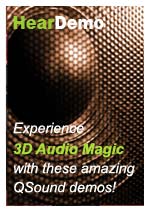Spotlight Feature
QSound Artist Spotlight: Kirk Kupensky
Kirk Kupensky's career as a harpist has been a diverse one, including forays into the realm of popular and new age music in addition to classical. He studied harp with former first chair harpists to the Cleveland, Berlin, and London Philharmonic Orchestras, and has made numerous appearances as recitalist and concerto soloist in the U.S. and in Europe. In his solo debut CD, "The Eternal Dreamer", Kirk uses QSound to help him express his interest in transcriptions and rarely heard music.
How did you become a harpist?
"I had played piano for many, many years, and basically, I just thought that harp would be something cool. I just thought it would be something that would interest me. I never really thought I'd have too much of an opportunity to do it, until I first went away to college at Hiram College and there was a harpist who lived nearby who taught at Kent State University. I got acquainted with her, and I said this is an instrument that I've always been very attracted to, and that I'd be interested in learning how to play it. She was very encouraging, so I got a starter instrument, and it took off from there. It wasn't anything that I grew up with -- I had already started harp rather late in life. But once I started, there was just no stopping me."
What do you consider to be some of your career highlights?
[audio excerpt // requires Windows Media Player]
How many recordings have you made?
"There is 'The Eternal Dreamer',
which is my solo debut, and there's one other before that which is a flute
and harp recording called 'The Fog is Lifting', which was never released
on CD. It came out on cassette only about twelve years ago -- at that time, doing CDs was just way too cost prohibitive.
Probably, within the next few months, that recording will re-emerge in CD
format.
Why did you choose those classical
pieces for "Eternal Dreamer?"
"Well, I wanted to make a classical harp CD that would have some use to it. I have been very disillusioned over the years with the kinds of classical harp recordings that are out there. Most of them have the same pieces on them. If you go to any large CD store, and look through the classical harp CDs, you'll see the same titles over and over. Now, there's a couple reasons for that. One is that there aren't too many of the great masters that have written pieces specifically for harp. And what is out there by the great masters tend to get recorded over and over because they, of course, are by great master composers, and people recognize their names. That's all well and good -- I certainly understand the commercial reasons for doing such a thing, but I wanted to do something very different. I wanted to do piano transcriptions that were famous pieces that people had probably never heard on harp before. But yet, they had to be pieces that still packed a pretty big emotional wallop. What I wanted to do was to create the kind of CD that you want to put on your CD player after you've had a rough day at work. I wasn't so much concerned with showing my technical ability as much as I was trying to create an environment for the listener."
"I also do a lot of work in music therapy where I play for terminally ill patients. And in some cases, I've even helped people to die peacefully. In America, this idea is taking off quite a bit. There are even hospitals which have harpists on staff exactly for this purpose. There is something about a harp. It's a very mystical instrument, and it's a very soothing instrument. It has a lot of visual connotation, with most people equating it to the angelic realms. It is a very sensual looking and sounding instrument, which has a very pronounced physical affect on a person who hears it. So, this CD was an extension of my work as a music therapist. That's what I wanted to create -- I wanted to take classical pieces, since the bulk of my training is as a classical performer, and I wanted to create something that would be used. A disc that would have a purpose as opposed to 'hey, doesn't this guy have great technique and he can play all of this beautiful music.'"
Who engineers and produces
your music?
"'Eternal Dreamer' was done by Gary Boggess of Boggess Music and Sound. He
was in Warren, Ohio, for a long time, but is now working in Tampa,
Florida. Gary has quite a resume. He did a lot of sound work for a lot of
big Hollywood motion pictures, including 'Batman and Robin' and 'Jurassic Park'. He's
quite a genius, and he did a lot of great sound design work for me on
'Eternal Dreamer'. Using QSound was actually Gary's idea."
How did you use QSound in your music?
"QSound was used quite subtly on 'Eternal Dreamer'. I wanted to create an
environment of sound, and you'll notice when you listen to it that deeper
and deeper into the CD, the sound becomes more and more reverberant from
one track to the next. It's a journey. At the beginning, I wanted the harp
to sound how you'd expect to hear a harp on a classical harp recording. It
gives the impression at the beginning of the disc that I could be in a
parlor or small auditorium... a very intimate recital setting. As the disc
progresses and the pieces become more emotionally charged, I wanted to
experiment with what the harp would sound like in a virtual space. For
instance, when you get to the last two cuts on 'Eternal Dreamer', I don't
know of any buildings or spaces that have a reverberant sound quite like
that. So what we did with QSound was to put it on the reflections and the
reverberations of the harp. So, when you hear the actual pluck of the
note, but it's the after-ring that tends to circle around the room. In
that way, we created a very subtle but cinematic effect. I didn't want to
beat people over the head with it, but I wanted to give the impression
that the listener could be aware, even at a subconscious level, that the
sound was wrapping around them."
How do you see QSound processing
fitting into your future projects?
[audio excerpt // requires Windows Media Player]
What qualities are you looking for in your sound?
"I'm always looking for a dreamy kind of quality. I'm not trying to push myself on the market as some kind of classical virtuoso. It's not about me, it's about what the music represents and what it's going to mean to the listener, and the emotion behind it. That, as I've grown older, is becoming more important to me than just turning the spotlight on me and saying, 'look at what I can do'. When you're a harpist, you deal with the fact that it has a very physiological effect on people. I want to expand more into the therapy realm of it, and hope that

